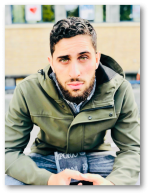 Ilyaas Sherally
Ilyaas Sherally
Policy Advisor with Ministerie van Buitenlandse Zaken
Why did you choose the MA in Global Thought and how did it prepare you for your current position?
I was working at the Netherlands Representative Office in Palestine when I applied to the M.A. in Global Thought. At the time, I remember looking for a graduate program that would provide me with the academic freedom to combine, as well as fine tune, my diverse academic and professional interests. Ultimately, I was searching for a program that was interdisciplinary in nature, flexible in its curriculum and student-centred in its approach. Given my own international background, I also attached great value to the international mix of students within the program.
The M.A. in Global Thought provides a unique combination of world-class scholarly depth, drawn from across the renowned schools within Columbia University, and a cutting-edge and globally conscious curriculum that capitalises on its location in the cosmopolitan city of New York. The program’s holistic approach prepared me well for my current job as a diplomat at the Netherlands embassy in Doha, Qatar. Working on political affairs is not a one-dimensional exercise and the program deepened my understanding on the intricate processes and debates that shape today’s contemporary world. In addition to an interdisciplinary perspective, the various courses also tangibly enhanced my expertise on various themes and policy that I work on daily.
Describe a favourite MA in Global Thought course or project and how it helped your academic, professional, and/or personal growth.
It is difficult to single out a specific course or project, but two courses do immediately come to mind. First, the Foundation to Islamic Studies and Muslim Societies seminar taught by Kathryn Spellman Poots. Needless to say, the content of the course was excellent, but it was the specific structure that made it memorable. Throughout the course, weekly guest sessions led by renowned faculty within the MESAAS department allowed us to directly engage with the very authors of the works we had been reading. It was incredible that I could critically address theoretical questions and debates about religion, culture and civilization, secularization, law and authority, nation-states and globalization with the very authors who work on these respective themes. Brinkley Messick, Lila Abu-Lughod, Mahmood Mamdani and Wael Hallaq are only a few of the scholars that lead the seminars.
The two-semester long M.A. seminar course was also one of my favourite seminars. It was, without a doubt, my fellow CGT students who made this course memorable. The fact that the seminar was held solely with the CGT cohort, who had all become close friends, provided a comfortable and familiar atmosphere. This resulted in many animated debates on a wide range of topics of political, economic and cultural importance. Aside from delivering some of the most memorable moments at Columbia, the discussions also facilitated a steep learning curve to address complex problems through an interdisciplinary lens stripped from ethnocentrism. Finally, the seminar culminated in a final M.A. thesis, which was ultimately the piece of work that brought my year long studies together.
How did you come to work in your current career field and what inspires you about your work?
Somewhat ironically, it was actually a distinct dissonance with politics that ultimately led me to pursue a career within diplomacy. I realized that the concept of ‘the political’ was inescapable, as well as omnipresent in every single sphere, be it economic, social or cultural. While this bothered me, it simultaneously intrigued me to engage further with ‘the political’, and in particular its relation with moral and ethical desiderata. Additionally, my international upbringing, which was accompanied by an interest in languages, different cultures and personal narratives, made a career in diplomacy a natural choice.
The multifaceted nature of diplomacy is what inspires me. Although I work on political affairs, I am able to also engage with economic, social and cultural matters. The diversity in my day-to-day work, as well as the countless individuals I get to meet, inspires me greatly. As we continue to move into a messy, dynamic, and asymmetrical world, we are more than ever in need of genuine dialogue, complex balancing, and ethics-based problem solving.
What advice would you offer current Global Thought students as they enter the job market?
We live in bizarre times, so take it easy. Set your goals, but remember not to be too harsh on yourself. We all have our respective aspirations, but no job pursuit is ever the ‘be-all end-all’. Take advantage of the interdisciplinary nature of your degree and use every opportunity you have to make connections. And remember, the alumni community is here to support you as well!